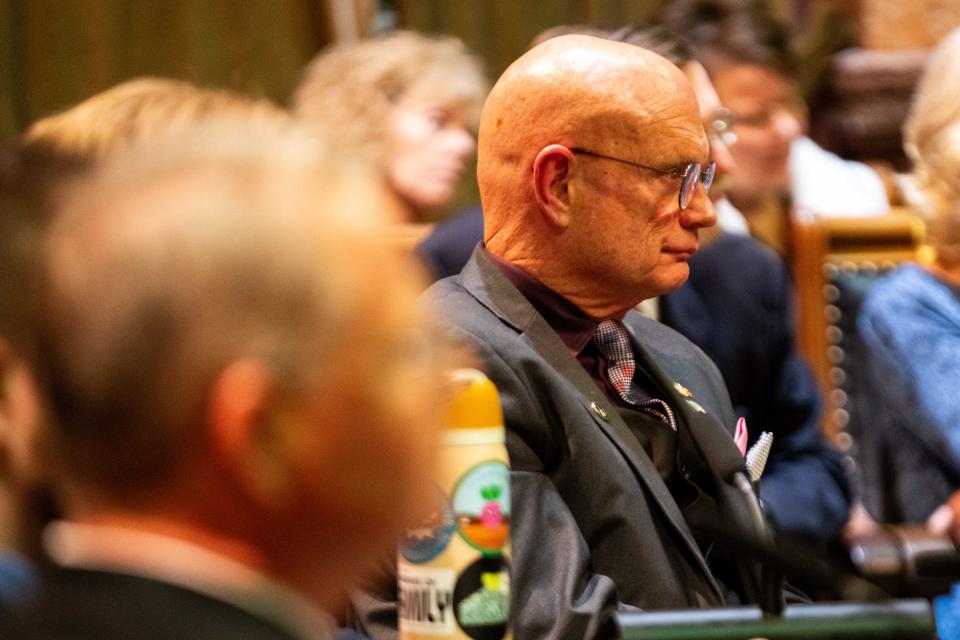'Hungry for Republican red meat': 2024 Iowa primaries show many GOP voters want more MAGA
Iowa Republicans are winning more elections than at any time in decades. They hold both U.S. Senate seats and all four of Iowa’s U.S. House seats — with strong prospects to retain them in November.
But Tuesday’s primary elections point to a simmering dissatisfaction among the GOP base.
Right-wing challengers with no money and relatively little name recognition took home about 40% of the vote against a pair of two-term incumbent Republicans.
They outperformed all but one of Iowa’s congressional primary challengers since 2010.
In southeast Iowa’s 1st Congressional District, David Pautsch, a businessman and founder of the Quad Cities Prayer Breakfast, took 44% of the vote in his bid to unseat U.S. Rep. Mariannette Miller-Meeks, who won with 56%.
And in the 4th District in western Iowa, Kevin Virgil, a businessman who returned to his home state of Iowa to run for Congress this year, took about 40% to U.S. Rep. Randy Feenstra’s 60%.
More: 6 key takeaways from Iowa's 2024 primary elections
Pautsch won five of 20 counties in the 1st District, and Virgil won nine of 36 counties in the 4th District.
Erin Covey, an analyst with the Cook Political Report focusing on U.S. House races, said she was surprised the margins were so relatively slim for Miller-Meeks and Feenstra.
“The party base has certainly moved further to the right of where a lot of these Republican House members are at this point,” she said, noting that it’s why several “reliably conservative” members across the country faced primaries this year.
Eric Woolson, a former Iowa Republican political consultant, said Iowa Republican voters have shifted to the right over the last decade, particularly as hard right conservatives such as U.S. Reps. Matt Gaetz and Marjorie Taylor Greene gain prominence in conservative media and within former president Donald Trump’s “MAGA” movement.
“I think that shift has clearly occurred since 2016,” he said. “This habit of wanting to eat your own wasn't nearly as prevalent as it is now. And it's people who haven't been in the party very long and are angry with the party.”
More: 2024 Iowa Primary Election Results
Is Mariannette Miller-Meeks 'MAGA' enough for Iowa primary voters?
Pautsch told the Des Moines Register that his strong showing indicates that GOP primary voters “are hungry for Republican red meat.”
“They’re tired of people talking out of both sides of their mouth,” he said. “And they want people who are courageous and brave. They want principled people, and (Miller-Meeks) has been anything but that.”

He said he hasn’t ruled out running for office again.
“I don’t know of anything specific right now, but I’m not ruling it out in the future either,” he said.
Pautsch said the border is the biggest issue that his voters are frustrated about. In his campaign, he also accused Miller-Meeks of not doing enough to rein in the national debt or ban abortion.
“They’re really, really fed up,” he said of his voters. “Not just slightly fed up — really fed up.”
More: US Rep. Mariannette Miller-Meeks staves off David Pautsch in 1st District GOP primary
Pautsch said “half the Republicans” in Congress vote with Democrats most of the time and accused them of being “bought and paid for.”
“In fact, the entire congressional contingent from Iowa needs to be replaced,” he said.
Some members of the razor-thin House Republican majority have at times threatened to shut down the government over both immigration and spending, but leadership ultimately allowed votes on bills that did not include conservatives’ demands.
More: Which of Iowa's congressional delegation ranked the most bipartisan?
Miller-Meeks has pointed to the House taking action on those issues, passing bills on border security, spending and more, which she supported, but those bills never stood a chance of passing the Democratic-controlled Senate.

She said Biden and Senate Democrats wanted Republicans to shut down the government so they could score a political win.
"The reality is shutting down the government was not going to cause President Biden to close the border," she said. "What is causing him to take action now when he said he couldn’t do it two years ago is the fact that his disapproval has gone even higher."
Miller-Meeks said she wasn't surprised by Pautsch's margin in the race, adding that the campaign featured some "embellishment" of her record. She said she tried to run her campaign by focusing on her own record in Congress and not criticizing Pautsch.
"We could certainly have gone negative but we did not," she said. "And the reason we did not is because for those people who were supporting my primary opponent, we want to give them a pathway back to support me in the general election."
Woolson, who previously has worked on Miller-Meeks' campaigns, said he believes the relatively strong showing for Pautsch came from voters who don’t believe Miller-Meeks has aligned herself closely enough with Trump.
Pautsch criticized Miller-Meeks for voting to certify the 2020 election. And although he did not receive Trump’s endorsement, Pautsch on the campaign trail routinely touted his closeness to the former president.
“From the Miller-Meeks numbers, I take that as, you know, the hard right, the MAGA people, didn't feel like Miller-Meeks was MAGA enough,” Woolson said.
He said it could be difficult for her to keep the GOP base happy while also appealing to a general election audience that includes moderates and independent voters.
“You're trying to ride two horses with one behind, basically,” Woolson said. “Because you're trying to say, ‘I'm 100% for Donald Trump’ with Republican audiences, and then you've got to turn around and say, ‘Well, I'm going to work for Iowa and disagree with Trump when it's necessary.’”
Kevin Virgil taps into anti-pipeline, anti-incumbent discontent
Virgil mounted a campaign against Feenstra in January, saying he opposed Feenstra’s votes to send foreign aid to Ukraine, Israel and Taiwan, as well as his support for proposed carbon capture pipeline subsidies.
He moved from Washington, D.C., back to his home state of Iowa to run for Congress and raised just $42,500 through April, according to federal financial reports.

Although he lost the race by about 20 percentage points, he claimed on election night that his showing sent a message.
“My incumbent opponent claims that ‘Iowa sent a clear message’ tonight,” he wrote on the social media site X. “Yes, the 'message' is that 40% of #IA04 voted against him — and in favor of a challenger with zero name recognition, who only entered the race five months ago tonight.”
Virgil said he intends to continue pushing back against Feenstra and suggested he may seek the office again in 2026.
“Tonight, the establishment and the political machine won,” he wrote. “But resistance is building against them. Voters are tired of being sold out and lied to. Iowans deserve better. … We've learned a lot, and in 2026 we are going to win.”

He told the Register he is not making any formal announcement about his intentions “yet.”
Billy Fuerst, a spokesperson for Feenstra, highlighted Feenstra's record and said the focus now is on winning in November.
"Randy has never lost an election because he has always remained focused on delivering conservative results for Iowa in every office he’s held," Fuerst said in a statement. "He is incredibly grateful for the overwhelming support he received on Tuesday and will never take for granted the opportunity he has to serve the people of Iowa. His focus now turns to winning the general election and continuing his fight to end Chinese ownership of Iowa’s farm land, stopping Biden’s border crisis and defeating Joe Biden."
More: Rep. Randy Feenstra defeats Kevin Virgil in Iowa's 4th Congressional District GOP primary
Rep. Steven Holt, R-Denison, who has been a leading opponent of the use of eminent domain for carbon capture pipelines that are proposed to cross Iowa, said he thinks the issue resonated with voters in the 4th Congressional District.
Holt said those dynamics were evident in Feenstra’s race, as well as a close primary race for Sen. Waylon Brown, R-Osage, who won 53% to 47% over a challenger who ran on opposition to the pipeline.
“I think the CO2 pipeline issue is a big issue here, and I think people wanted to hear from Rep. Feenstra on that issue,” he said. “And that was a big issue that Kevin Virgil made in the campaign.”
Pipelines also played a major part in South Dakota’s primary elections this week, where 14 incumbent state lawmakers lost primaries. In many of those races, opposition to carbon pipelines was a major issue for the challengers.
Holt also pointed to immigration and federal government spending as two issues Republican voters want to see more action on from Congress.
“I think there’s a lot of people that think that the Republicans should be doing more on the southern border,” he said. “They should be demanding more on the out of control spending that’s going to bankrupt this country.”

Woolson said he thinks the MAGA movement has attracted people to politics who haven’t been involved before, and many are angry at what they see as inaction in Congress.
“If you're somebody who has been involved in the process for 30 or 40 years, well, you're part of the problem in their mind,” he said.
Will Republican voters support the GOP nominees in November?
Covey, the elections analyst, said it’s likely most of the Republicans who voted for Pautsch and Virgil will come home and vote for the Republican congressional candidates in November.
Still, she said, there’s a concern within the party that some voters will pick Trump at the top of the ticket and opt out of participating in the down-ballot races if they don’t perceive candidates to be sufficiently "MAGA."
For some candidates in closely contested races, as Miller-Meeks could be, that can be a concern.
“When it's a super close race, any dynamic like that can impact your margin,” Covey said. “It's a game of inches.”
Pautsch said he does not plan to vote for Miller-Meeks in November, and said he imagines a lot of his nearly 13,000 voters will feel similarly.
“The technical protocol being urged in the party is that you’ve got to get behind your candidate once the primary is over,” he said. “Well, not if the candidates are wicked. You just can’t violate your conscience.”
In particular, Pautsch cited Miller-Meeks’ stance on abortion.
“I can’t vote for a woman who is in agreement with killing babies,” he said. “I just can’t do it. I’ll probably do a write-in candidate, but I will not (vote for Miller-Meeks). That’s just absolutely against my conscience.”
Miller-Meeks describes herself as “pro-life” while saying she supports in vitro fertilization and emphasizing her belief that abortion policy should be left to the states. Democratic challenger Christina Bohannan plans to hammer Miller-Meeks’ opposition to abortion in the general election.
“I’m pro-life with exceptions for rape, incest and life of the mother," Miller-Meeks told the Register ahead of the primary. "For some individuals and some Republicans, they believe there should be no abortion and no exceptions. I’m not in that camp.”
She said she's going to win over as many Republicans as possible by criticizing the Biden administration's record and congressional Democrats' support for the same policies.
"When people look at what the Biden administration has given them, they’re definitely not better off than they were four years ago," she said. "And that’s the case that we’re going to make."
Holt, the Denison lawmaker, said he thinks most voters will end up coming home to the Republican Party and voting for the GOP congressional candidates in November.
“There may be some people who are so frustrated they stay home,” he said. “But I think most people are going to recognize that we’re at a critical time and they’ve got to vote.”
Zach Nunn and Ashley Hinson escape GOP primaries
Not every Republican congressional candidate faced primary challenges. U.S. Rep. Ashley Hinson in the 2nd District and U.S. Rep. Zach Nunn in the 3rd District ran unopposed.
But Woolson wondered whether the “anti-incumbent” sentiment that emerged on Election Day is also simmering within their districts.
“I'd be curious to see, had Congresswoman Hinson and Congressman Nunn had opponents, would they have had a similar margin?” he asked.
More: Lanon Baccam wins Democratic nomination in Iowa's 3rd District, will face US Rep. Zach Nunn
In the 3rd District — where Nunn ran unopposed — Kelley Koch, the chair of the Dallas County Republicans, admitted that the other congressional primaries were “closer than I thought.”
Koch called Nunn “the perfect candidate,” who remains attentive to Dallas County despite “a few votes that I’m not thrilled about.” He’ll seek his second term in a district he won by 2,000 votes in 2022.

“We’ve got to have somebody like him,” Koch said. “So any other Republican that would have challenged him in a primary would be ridiculous. It really would. He’s the guy.”
Brianne Pfannenstiel is the chief politics reporter for the Des Moines Register. She is also covering the 2024 presidential race for USA TODAY as a senior national campaign correspondent. Reach her at [email protected] or 515-284-8244. Follow her on Twitter at @brianneDMR.
Stephen Gruber-Miller covers the Iowa Statehouse and politics for the Register. He can be reached by email at [email protected] or by phone at 515-284-8169. Follow him on Twitter at @sgrubermiller.
Galen Bacharier covers the Statehouse & politics for the Register. Reach him at [email protected]m or (573) 219-7440, and follow him on Twitter @galenbacharier.
This article originally appeared on Des Moines Register: More MAGA? What Iowa's 2024 primaries say about GOP's shifting voters